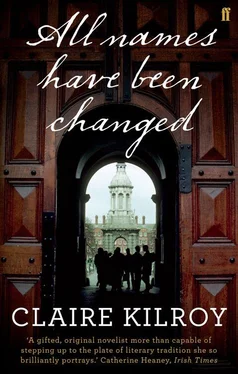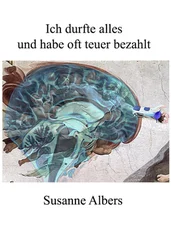Claire Kilroy - All Names Have Been Changed
Здесь есть возможность читать онлайн «Claire Kilroy - All Names Have Been Changed» весь текст электронной книги совершенно бесплатно (целиком полную версию без сокращений). В некоторых случаях можно слушать аудио, скачать через торрент в формате fb2 и присутствует краткое содержание. Год выпуска: 2010, Издательство: Faber & Faber, Жанр: Современная проза, на английском языке. Описание произведения, (предисловие) а так же отзывы посетителей доступны на портале библиотеки ЛибКат.
- Название:All Names Have Been Changed
- Автор:
- Издательство:Faber & Faber
- Жанр:
- Год:2010
- ISBN:нет данных
- Рейтинг книги:5 / 5. Голосов: 1
-
Избранное:Добавить в избранное
- Отзывы:
-
Ваша оценка:
- 100
- 1
- 2
- 3
- 4
- 5
All Names Have Been Changed: краткое содержание, описание и аннотация
Предлагаем к чтению аннотацию, описание, краткое содержание или предисловие (зависит от того, что написал сам автор книги «All Names Have Been Changed»). Если вы не нашли необходимую информацию о книге — напишите в комментариях, мы постараемся отыскать её.
All Names Have Been Changed — читать онлайн бесплатно полную книгу (весь текст) целиком
Ниже представлен текст книги, разбитый по страницам. Система сохранения места последней прочитанной страницы, позволяет с удобством читать онлайн бесплатно книгу «All Names Have Been Changed», без необходимости каждый раз заново искать на чём Вы остановились. Поставьте закладку, и сможете в любой момент перейти на страницу, на которой закончили чтение.
Интервал:
Закладка:
‘Shut up,’ she warned us, and we did.
There was something about Aisling’s delivery on that occasion that made us pay absolute heed to her. The five of us drank in sullen silence until our glasses were drained. It didn’t take long. Where was Glynn for all of this? God knows. And yet he seemed the very epicentre of the incident, present and amongst us in some auditing capacity, watching our five miniatures through a crystal ball, goading us into the expression of contentious opinions we didn’t know we held so strongly, or even held at all. God forbid that we should disappoint him. We spoke our lines for him alone. They would filter back for his critical appraisal through one channel or another. Everything filtered back to Glynn, eventually. Everything bore his mark. I do not remember how that particular evening ended. Unsatisfactorily, I suppose.
And so Guinevere read to us her inspired solution to the quandary she said had plagued her (and plagued Antonia too, whether she admitted it or not): her novel narrated by a man. After a few sentences, we acclimatised to her light voice recreating that of an American male, until soon we were hearing not Guinevere’s Irish accent, but Maxwell Hartman’s East Coast burr. It crept up on you gradually, the cumulative impact of all that unassuming detail, the combined weight of those deceptively throwaway observations. It stole up, gathered round, had you surrounded, snug, until without warning it had come to life: Maxwell Hartman was in the room.
It was the polar opposite of Aisling’s reading, which foregrounded not the subject matter but the struggle of the artist herself. Guinevere receded altogether as a fictional character appeared in her skin, pressing his face into hers. There were times when it was clear that Guinevere could have done anything she wanted. Her use of the disappointed male voice generated a tragic resonance, but the real tragedy to my mind was that a young woman perceived an ostensibly successful and powerful businessman as so abjectly pitiful. Was that what got to me about Guinevere’s writing: her ability to see through the male armoury to the shivering wretch underneath? Was that what made me come to her?
Mike adjusted his ponytail and read an extract from some class of crime fiction, some scrape about a good guy, a bad guy, a blonde and a bag of loot. The women didn’t appreciate his efforts either, though Glynn bestowed upon him a hearty wink. And then it was my turn. I leafed through my manuscript in a harassed fashion for no good reason. It wasn’t like the pages had scrambled into the wrong order behind my back. I was barely a paragraph into Chapter One when Glynn interrupted me.
‘What happened your eye?’ he demanded.
What eye, I wondered. There was no eye in Chapter One. Never had been. Or did he mean I, the first-person narrator?
Glynn raised his glasses to his forehead, awaiting an explanation. The lenses framed two rectangles of skin, as if a second, covert set of eyes was concealed behind the pink membrane, his mind’s eye, his artist’s eye, window to his imagination.
‘Your eye,’ he repeated, nodding at my shiner. ‘What happened? Someone give you a dig?’
‘Oh that,’ I said. ‘Yes.’
‘Was it over a woman?’
‘No,’ I said apologetically.
Glynn peered at my black eye for another few seconds, then dropped his glasses back onto his nose to indicate that he’d lost interest. I shuffled my sheaf of papers as needlessly as before and returned to the business of reading out Chapter One. Anyone could see that it was about Guinevere, and that I wasn’t up to the job. I listened to the lonely sound of my own voice losing conviction with every word. Soon it had dwindled to a barely audible trickle. I think this is how a parent must feel to discover that his child is not clever, or pretty, or even happy. The less said about the whole thing the better.
10 You scumbag, you faggot
The payphone in the corridor started ringing in the small hours later that same night. I was out of the bed and running down the stairs before I knew what was going on. ‘Who’s there?’ I challenged the mouthpiece, as if the person on the other end had broken into the building. ‘Giz woz ere’ was scratched onto the coin-box casing. A light on the ground floor came on.
‘Declan?’ Guinevere’s voice. I recognised it instantly. ‘It’s Glynn,’ she said. ‘He’s in trouble. Can you help us? We’re on Duke Street.’
It would take a good half-hour to reach Duke Street on foot, no matter how hard I ran. The fucker downstairs had stolen my bike. I pummelled his door with my fists on the way out. ‘Give me back my bike, you prick!’ I shouted, but didn’t stick around for a response.
It was a freezing November night, no cloud cover, a rack of winter stars. A dog howled forlornly in the distance. Three knackers in silky tracksuits stood huddled at the entrance to the park. I pressed on. Guinevere was waiting on the other side of the river. I couldn’t let her down.
The knackers lunged at me as I passed. They pursued me halfway up the street, white runners pistoning, then lost impetus and fell by the wayside. Their heart wasn’t in it. The chase was just for show. I heard them laughing with bravado at my retreat, at the great triumph it denoted. ‘Little Trinity gee-bag,’ one of them shouted, then fired an empty can in my direction. It fell far short of its target. How did they know I went to Trinity? A life force I didn’t think aware of my existence turned out to be monitoring my movements. It was as if the street-lamps had started to speak, or the gateposts nodded at my return.
*
A tall lone female was standing at the mouth of the service lane to Brown Thomas when I rounded the corner onto Duke Street from Grafton Street. My heart surged at the sight of her, and I waved. The figure did not return my greeting but unfolded her arms and threw her cigarette to the ground. The street lighting glanced off the crown of her head as she did so. Blonde bobbed hair. Antonia. My hand dropped to my side.
She didn’t speak when I drew up, just checked her watch in irritation. You would think I had kept her waiting. ‘Where’s Guinevere?’ I asked.
‘Glynn, you mean. He’s down here.’
She led me down the lane in silence. The others were stationed throughout it, Aisling first, so black that she merged with the background. I didn’t realise she was there until she spoke. ‘Hi Declan,’ came her voice from the murk, the moon of her disembodied face materialising in the darkness. It was swaying slightly. Up ahead, amongst a pile of cardboard boxes and packing crates, bathed in the glow of a security lamp, lay the great man himself. Faye was on her knees ministering to him. Guinevere stood to attention at his head. It was the deathbed scene of a king.
Faye got to her feet when she saw me. ‘He’s taken a bit of a turn,’ she said apologetically, brushing down her skirt.
‘Hello Declan,’ said Guinevere. ‘Sorry to have called you in the middle of the night.’
‘That’s alright,’ I told her. ‘Any time.’
‘Mike wasn’t home, so we had to ring you instead,’ Antonia clarified, in case there was any doubt as to their first preference.
They stood back to allow me to examine the body, which was in the recovery position on the ground. I nudged Glynn in the ribs with the toe of my shoe. No response. ‘He’s asleep,’ I said. Aisling sniggered.
‘We can see that, thanks,’ said Antonia, and lit another cigarette.
‘Problem is,’ said Guinevere, ‘he won’t wake up.’
‘Why didn’t you call me earlier?’
‘We thought we could handle it ourselves,’ said Faye. Spurred sleech. I turned to look at her.
‘Have you lot been drinking since the workshop ended?’ That seemed like days ago.
Читать дальшеИнтервал:
Закладка:
Похожие книги на «All Names Have Been Changed»
Представляем Вашему вниманию похожие книги на «All Names Have Been Changed» списком для выбора. Мы отобрали схожую по названию и смыслу литературу в надежде предоставить читателям больше вариантов отыскать новые, интересные, ещё непрочитанные произведения.
Обсуждение, отзывы о книге «All Names Have Been Changed» и просто собственные мнения читателей. Оставьте ваши комментарии, напишите, что Вы думаете о произведении, его смысле или главных героях. Укажите что конкретно понравилось, а что нет, и почему Вы так считаете.












